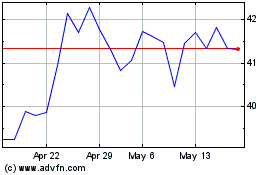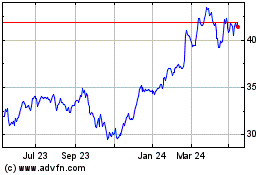By Alexandra Wexler
ADDIS ABABA, Ethiopia -- The world's biggest names in
hospitality are battling for a slice of one of the world's
fastest-growing markets for hotels: Africa.
Tourists are pouring into many of the continent's 54 nations in
record numbers, fueling development in traditional tourist hubs and
new investment in frontier markets. The continent boasts the
world's fastest-growing population, some of its most swiftly
expanding economies and a ballooning domestic-travel market driven
by Africa's expanding middle class.
The prospect of bumper growth across dozens of underdeveloped
markets -- some offering the potential to set higher room rates
than in London or New York -- is sparking billions of dollars in
investments from top operators, including Accor SA, Hilton
Worldwide Holdings Inc. and Marriott International Inc. A 2018
survey of 41 international and regional hotel chains by W
Hospitality Group, an advisory firm, shows 298 hotels in the
development pipeline across Sub-Saharan Africa, more than double
the pipeline in 2014.
The most robust growth is taking place beyond the continent's
established tourism hot spots of South Africa and Kenya in the
rising business hubs of Nigeria and Ethiopia.
In Addis Ababa, Ethiopia's highland capital, where gross
domestic product has grown 10% on average annually over the past
decade, the rising skeleton of a 450-room Four Points by Sheraton
is located opposite a swanky, contemporary Hyatt Regency that
opened Jan. 1. The city's vast new airport terminal, which opened
earlier this year, has more than doubled annual capacity to 22
million passengers.
"They have good Wi-Fi and good service," Ibrahim Hamza, a
28-year-old dentist from Addis Ababa, said of the Hyatt while
working on a laptop in its lobby on a recent weekday afternoon. "I
like the design and the interior -- it's unique."
Addis Ababa has become a hub for continental travel via its
state-owned Ethiopian Airlines and hosts the headquarters of the
United Nations Economic Commission for Africa as well as the
African Union.
Investments in hotels in Ethiopia reflect the shifting of
economic centers of gravity across the continent. With 31 hotels in
the pipeline, according to W Hospitality, Ethiopia is second in
Sub-Saharan Africa only to regional economic giant Nigeria.
Revenue in Africa per available room, a performance metric used
in the hotel industry, grew 11% in 2018, faster than in Europe,
where it climbed 5.2%, or Asia, where it rose 1.7%, according to
data and analytics firm STR. The continent trails just South
America, which grew a blistering 29% last year.
To be sure, many African markets are notorious for issues with
land rights, slow construction progress and graft.
"These hotels tend to take so much longer," said Mark
Martinovic, president and CEO of Hotel Spec International Inc., a
South Africa-based hotel-development consulting firm. He also cited
challenges in getting raw materials through customs in the
continent's ports, saying, "I call the [African hotel] pipeline the
'pipe dreams.' "
But many of the world's biggest names in hospitality say that
despite the enduring challenges for investors in Sub-Saharan
Africa, the continent's growth prospects are strong.
In July, Accor, which has over 140 hotels across 22 countries
continent-wide -- over 60 of them in Sub-Saharan Africa -- --
unveiled a $1 billion investment fund with Katara Hospitality, a
global hotel developer and operator owned by Qatar's government, to
help expand its footprint through both acquisitions and organic
growth. Accor plans to open 60 new properties in Africa by 2023.
Accor operates brands that include Fairmont, Sofitel and
Pullman.
"It's all about political and economic stability," said Mike
Collini, Hilton's vice president of development for Sub-Saharan
Africa. "If you look at Africa over the last three decades, it's
become significantly more politically stable."
Hilton, which is opening its first hotels in Botswana, Uganda
and Eswatini, formerly Swaziland, this year, plans to more than
double its footprint on the continent in the next five to seven
years, from more than 40 hotels currently. Last year, the hotel
operator opened a DoubleTree by Hilton in Pointe-Noire, Republic of
Congo, and entered Zambia.
In West Africa, Marriott plans to expand its current footprint
by 75%, or nine hotels, by the end of 2023. Radisson Hospitality AB
is also keen on the region, with plans to expand its nearly 100
hotels in operation and under development across 32 African
countries to 130 hotels by the end of 2022.
"Governments and businesses from all around the world are
rushing to strengthen diplomatic, strategic and commercial ties
with Africa, which has created vast opportunities," said Andrew
McLachlan, Radisson's senior vice president of development for
Sub-Saharan Africa.
Home-sharing company Airbnb Inc. has also expanded significantly
across the continent, notching up listings in every African
country. The continent accounts for three of Airbnb's eight-fastest
growing markets world-wide.
The dominance of Western brands stands out even in economies
that have in recent years built strong trade relationships with
China, Africa's largest investor, as China's vast infrastructure
projects pave the way for many new hotel plans.
But Chinese hospitality giant Jin Jiang International Holdings
Co. Ltd. is gaining ground. The company bought Louvre Hotels Group,
which operates more than two dozen hotels on the continent, in 2015
and led a consortium that acquired Radisson last year.
Hoteliers say there is more than enough room for everyone, with
high nightly rates -- an advantage of being in a frontier market
with few other options -- making up for some of the other
headaches. In Kinshasa, Democratic Republic of Congo, the average
daily rate is $300 a night, compared with an average of $198 a
night in London and $262 a night in New York, according to STR.
"If you drill down into it, there is such a significant
undersupply of quality accommodation," Hilton's Mr. Collini said.
"It's a market that warrants the investment and the focus that
we're applying."
Write to Alexandra Wexler at alexandra.wexler@wsj.com
(END) Dow Jones Newswires
May 01, 2019 12:36 ET (16:36 GMT)
Copyright (c) 2019 Dow Jones & Company, Inc.
Accor (EU:AC)
Historical Stock Chart
From Dec 2024 to Jan 2025

Accor (EU:AC)
Historical Stock Chart
From Jan 2024 to Jan 2025
